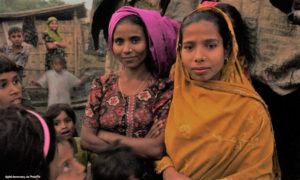
The Rohingya are an ethnic group, the majority of whom are Muslim, who are fleeing persecution in Myanmar where they have been living for centuries. The plight of Rohingya refugees in Bangladesh is worsening. Facing insecurity, overcrowding and inadequate access to food, water and shelter, women and girls living in Bangladeshi refugee camps are particularly vulnerable to violence, trafficking and sexual exploitation. A recent piece by the Thomson Reuters Foundation revealed that a clandestine sex trade is booming in the refugee camps, further bolstered by the recent additional influx of more than half a million Rohingya into Bangladesh. Additionally, reports indicate the chaotic conditions in the camps render children, especially girls and young women, particularly vulnerable to sex trafficking. Pimps and “fixers” in the refugee camps sell them to men from all walks of life — from university students to local government officials. Fellow refugees, who also hail from conservative Muslim communities, pretend not to notice the sex trade expanding around them.
Traffickers and pimps understand that these women and girls share commonalities with other vulnerable individuals beyond the desperate conditions they face in the refugee camps, including extreme poverty, a lack of alternatives to survive and being female. Members of a marginalized minority in Myanmar, Rohingya refugees were also deprived of equal access to education or job training. In addition, many of the women and girls also have a history of family abuse and sexual violence.
Services and the most basic necessities as well as gender-sensitive care and protection for vulnerable, exploited and trafficked women and girls are severely lacking in the camps. Our colleagues at the Coalition Against Trafficking in Women – Asia Pacific are working with former U.N. Special Rapporteur on trafficking in persons Sigma Huda to address these challenges in Chittagong, Bangladesh, one of the main arrival points for incoming Rohingya refugees. They are organizing assistance to provide housing, food and other services, and developing a program to share strategies to combat trafficking and gender-based violence with residents, law enforcement and direct service providers working in the camps. The Rohingya Refugee Anti-Trafficking project will assist women and their families in rebuilding their lives and will help protect vulnerable women and girls from trafficking, sexual exploitation and other forms of gender-based violence. The project needs funding urgently. Please donate today.


